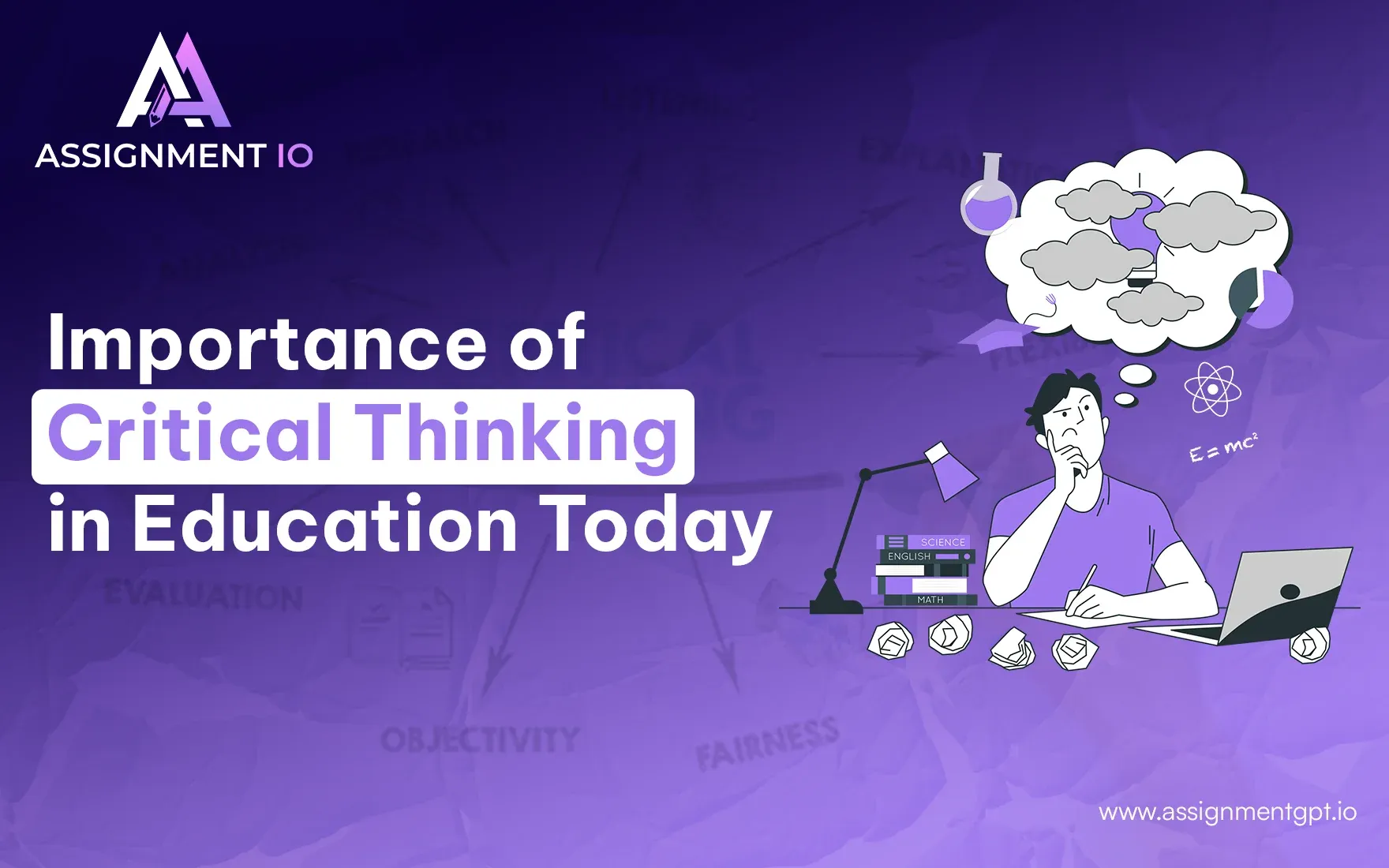Importance Of Critical Thinking In Education Today

Vikas Kukadiya
Today's rapidly changing world is much more than just needing an education that is based on memorizing all sorts of facts. An education would cover skills that prepare students to be able to analyze, evaluate, and solve problems. Critical thinking is also one of the most important and essential skills in education; it helps students truly comprehend information, think independently, and make well-informed judgments.
Quick Summary
Critical thinking is a valuable aspect of students' lives because it helps them internalize the facts and develop abilities regarding solving issues. Furthermore, it encourages the learners to the application of knowledge in real-life situations, hence making education more meaningful and practical for them. This particular skill must be gained for an informed decision-making process, not only in academics but also in day-to-day life. Critical thinking is one of the high values held by employers in the workplace because it enables an employee to analyze the situation, solve problems, and make sound judgments on a specific issue that requires the employee's expertise. Moreover, critical thinking cultivates responsible, engaged citizens capable of critically evaluating information in the increasingly complicated and information-rich world.
What Is Critical Thinking?
Critical thinking refers to the individual's ability whereby one thinks well, logically, and independently. It deals with the issues of analyzing information, questioning assumptions, and thereby making reasoned judgments. Critical thinkers also don't accept informed statistics at high face value; their arguments tend to identify biases and help decide a person's decision-making in an overall good way for solving problems in life and making more informed decisions.
Why Is Critical Thinking So Important In Education?
Thus critical thinking forms an essential dimension in education as it fosters independent thought, promotes problem-solving, and gives a deeper understanding of things. It is not limited to memorizing but helps in connecting knowledge to real situations. It prepares a student to face the workplace, helps in developing responsible citizenship, and prepares for lifelong learning.
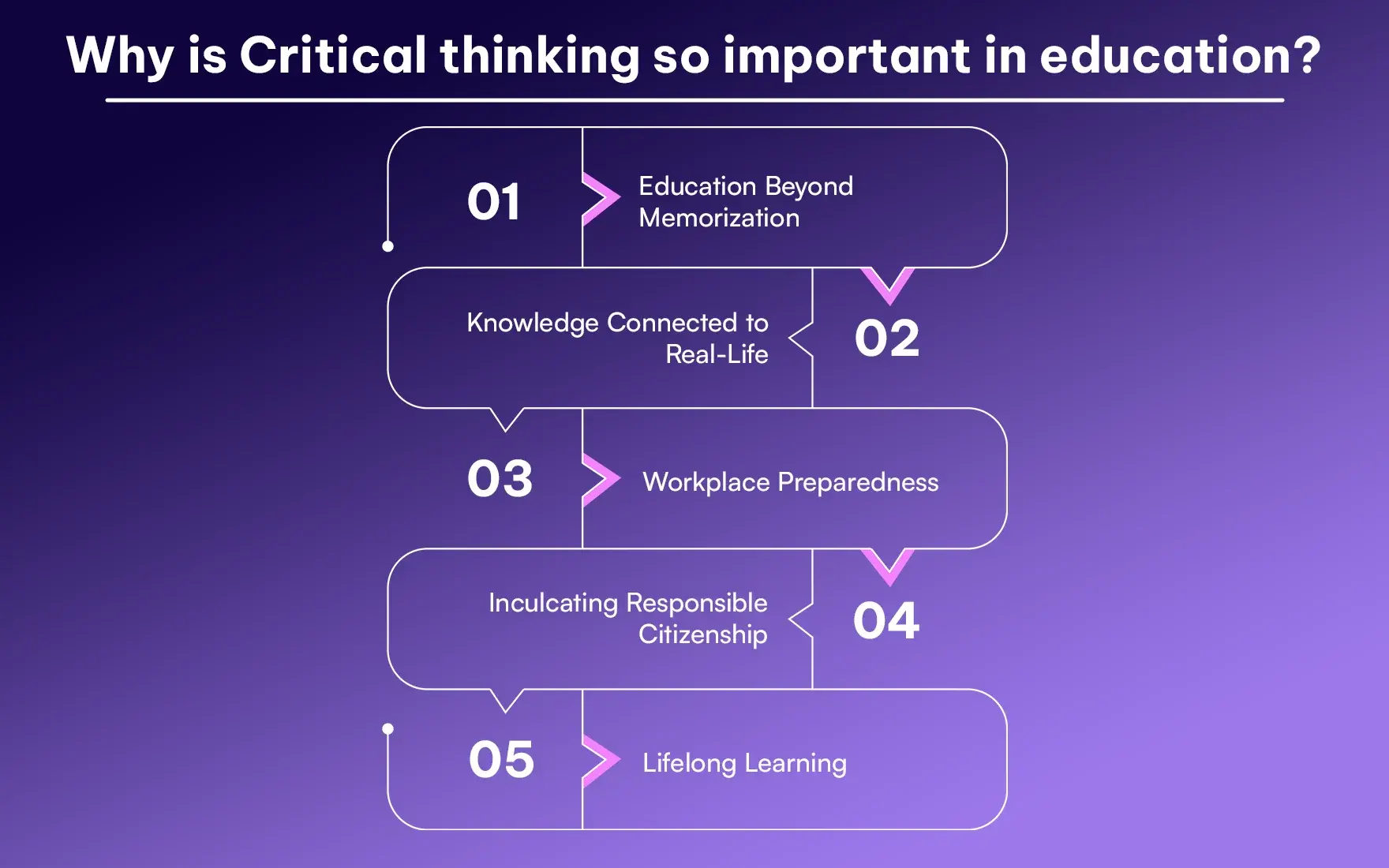
1. Education Beyond Memorization
Education is not mainly about memorizing facts and figures. A good education teaches students to think for themselves and to have an understanding of their world. This very critical thinking allows students to evaluate information, solve problems, and come to reasonable conclusions.
2. Knowledge Connected to Real-Life
Traditional education seems to place great emphasis on learning mere facts. Critical thinking allows the students to question and discern the real reason behind those facts. In other words, students are able to analyze historical occurrences and relate them to current affairs rather than just memorize the facts.
3. Workplace Preparedness
Today, employers are looking for employees who can analyze a problem, find solutions, and communicate effectively. Critical thinking applies to all fields—science, technology, business, and even the arts.
4. Inculcating Responsible Citizenship
For a healthy democracy, citizens must assess political arguments, recognize misinformation, and make reasoned choices. Engaging in the process of critical thinking empowers people to contribute to constructive dialogues within society.
5. Lifelong Learning
Learning is a fluid process because the world is changing, and it never really stops after school. Individuals with exceptional critical thinking skills are perpetually curious, adaptable, and open to new thoughts, giving them the ability to thrive in any kind of environment.
Also read this article : 7 Best Tips For Finishing Your Homework Fast
Benefits Of Using Critical Thinking
Critical thinking improves problem-solving, decision-making, and analytical skills valuable for education and everyday life. This skill allows the evaluation of the information objectively, the perception of bias, and the making of an informed decision. It further enhances skills with effective communication, stimulation of creativity, and preparedness for the challenges in the workplace, all-in-all promoting personal and professional growth. The advantages that critical thinking captures are of importance not only in education but also in day-to-day activities. There are several critical benefits for key critical thinking:
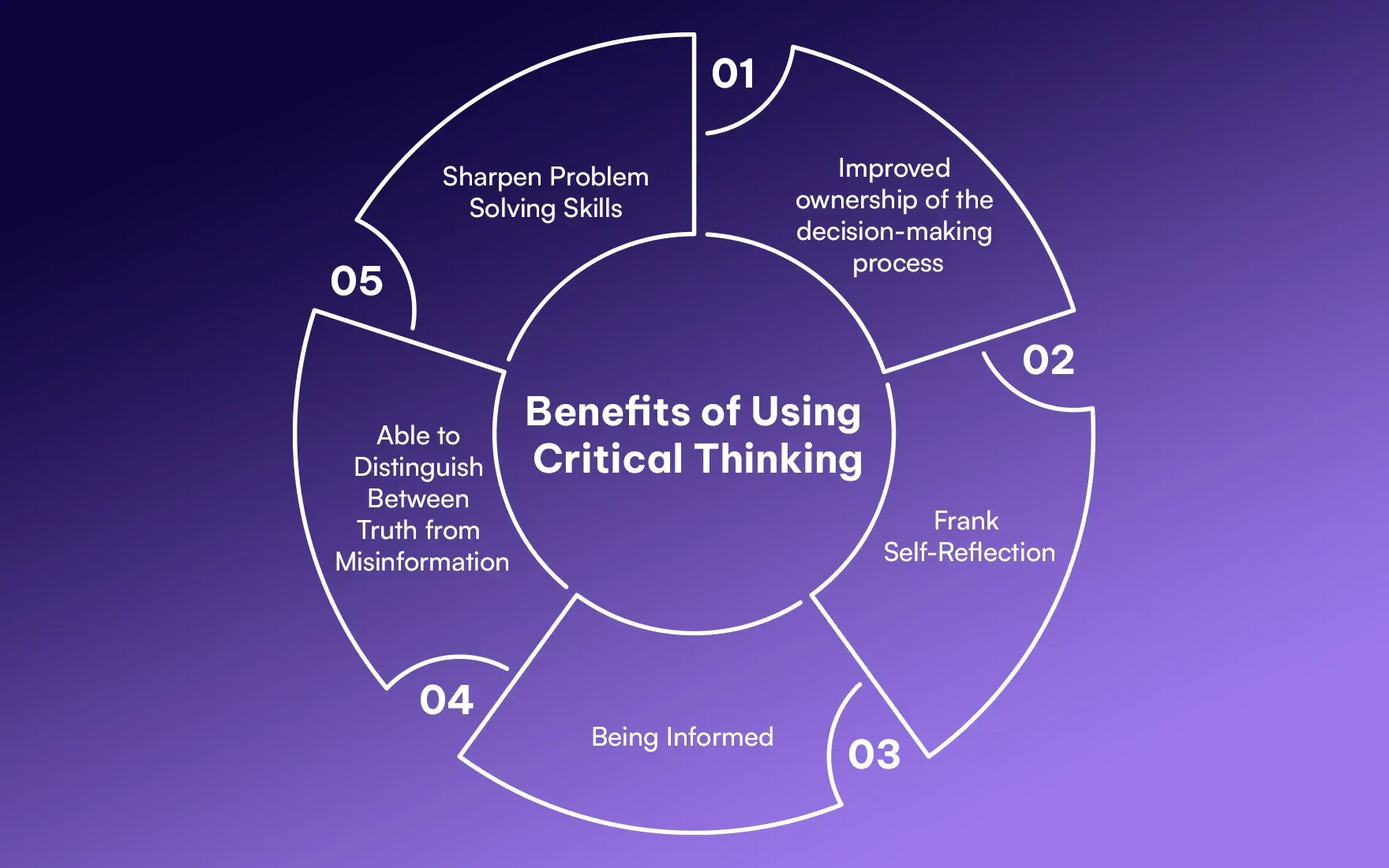
- Improved ownership of the decision-making process
Critical thinkers will analyze situations using logical thinking, weigh alternatives, and try to anticipate likely outcomes. Informed, rational decisions make the customized less risky and maximize the good results in life for both personal and professional aspects.
- Frank Self-Reflection
In further defining critical thought, self-awareness becomes critical, with one's identities and shortcomings visible in a different light. Such reflection helps refine decision-making, personal growth, and even development of intellectual humility.
- Being Informed
Critical thinkers are always likely to find different angles, check up different facts, and refer to real sources. Such gains will immediately serve to improve knowledge and even put the work of making arguments more solid and perfect for falling into traps by false information.
- Able to Distinguish Between Truth from Misinformation
A lot of information online confuses people nowadays. It is this critical thinking that encourages people to question everything, as well as verifying claims and letting them know how to distinguish between reliable and false information, eventually resulting in well-informed opinions and coherent media consumption.
- Sharpen Problem-Solving Skills
Critical thinkers analyze problems from multiple angles before tackling them systematically. This method tends to yield more creative and effective solutions that get to the heart of the problem and innovative problem solving in various other situations.
What Are Some Of The Skills Critical Thinkers Have?
Critical thinkers excel in problem-solving, analysis, logical reasoning, creativity, communication, and decision-making, enabling them to evaluate information effectively.
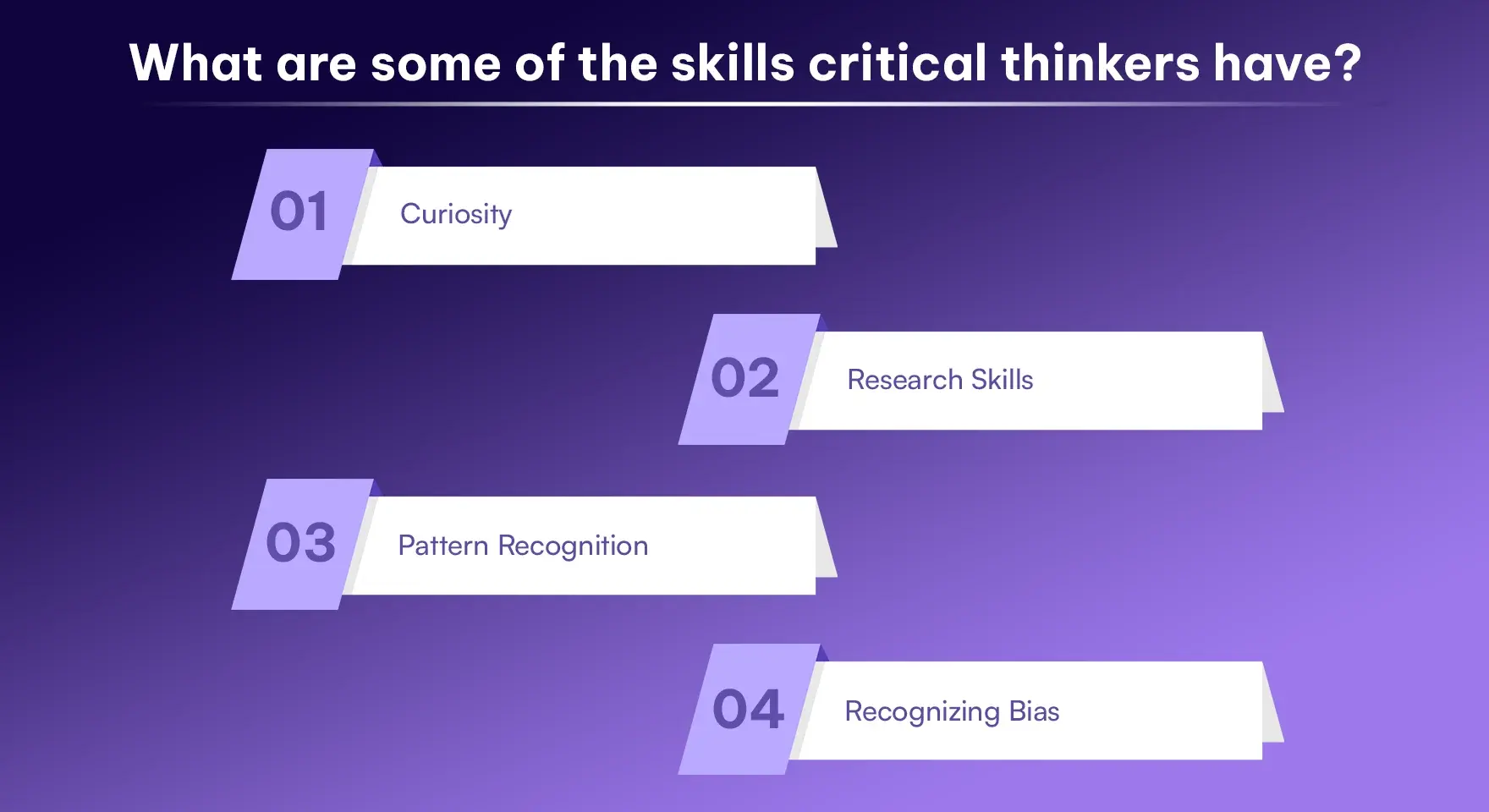
Curiosity The critical thinker is intrinsically motivated to learn and inquire. This desire fuels the need to view the topic from various perspectives to gain a reasonably objective understanding.
Research Skills They know how to search for reliable information, analyze data, and check sources. Thus, they can come to conclusions well supported by facts rather than mere assumptions.
Pattern Recognition They can discern trends, similarities, and linkages between ideas. In consequence, they can project outcomes and solve problems more effectively.
Recognizing Bias Critical thinkers are aware of their own biases and make an effort to take an objective stance. They make a distinction between emotions and facts, therefore calling for logical and fair judgments.
Critical Thinking In The Workplace: How To Use It
Critical thinking is one of the basic components of a job. Staff members who can think critically will assist a company in finding solutions to problems, making decisions based on evidence, and innovating when necessary. Here are some applications of critical thinking in the workplace.
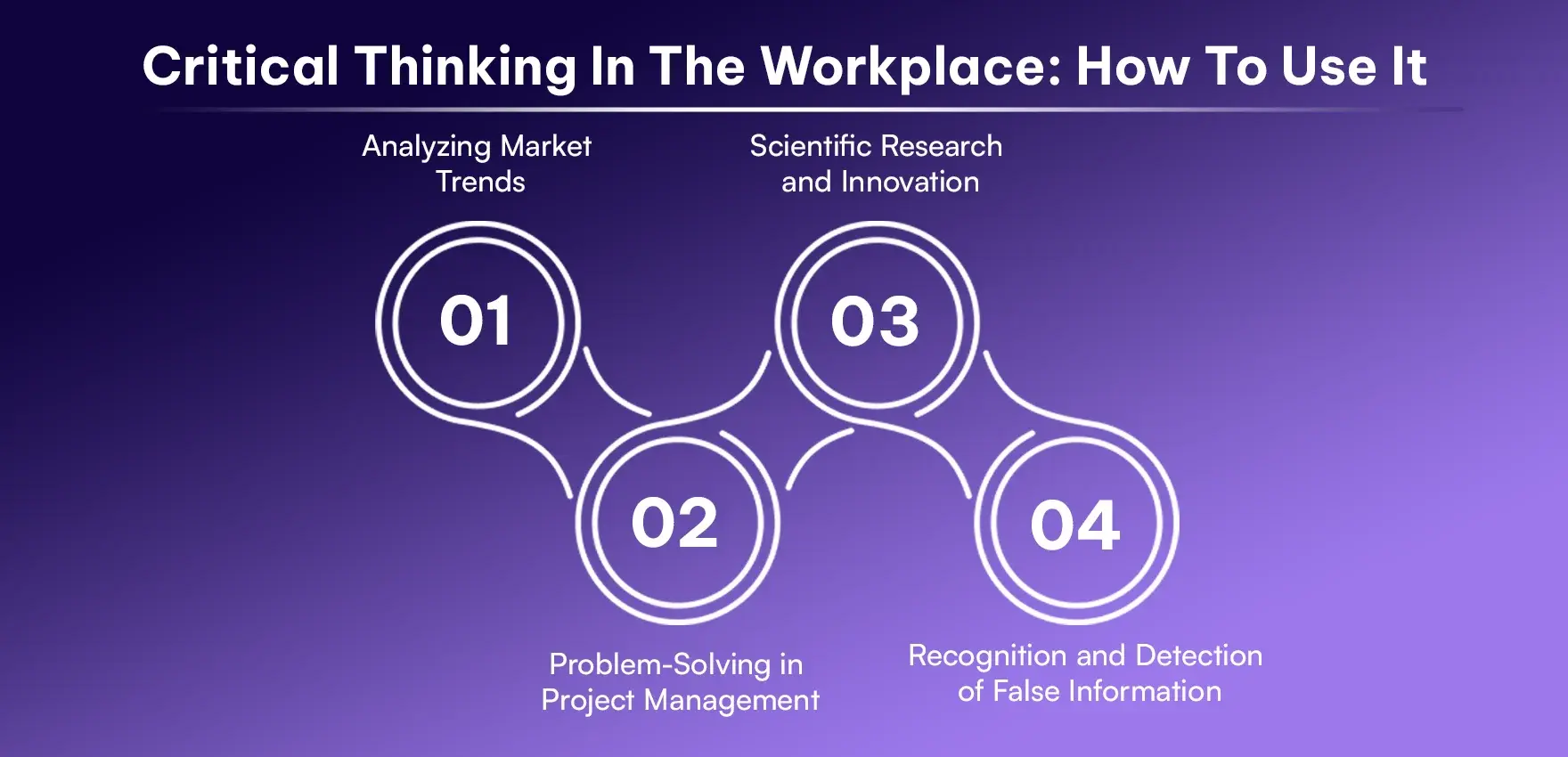
Analyzing Market Trends Before launching into a campaign, an advertising professional can apply critical thinking in examining consumer behavior and competitive strategies.
Problem-Solving in Project Management The project manager works on identifying the problem, formulating the different solutions, and then implementing the best possible plan for achieving success.
Scientific Research and Innovation Critical thinking would be very helpful to researchers for datacross-the-board hypothesis testing and breakthrough discoveries.
Recognition and Detection of False Information Financial employees, legal employees, and media employees detect fraud, validate the sources of fraud, and then reach other decisions.
Critical Thinking Examples in Different Subjects
Critical thinking is useful in almost every discipline and enables students to put what they learn into practice. This includes:
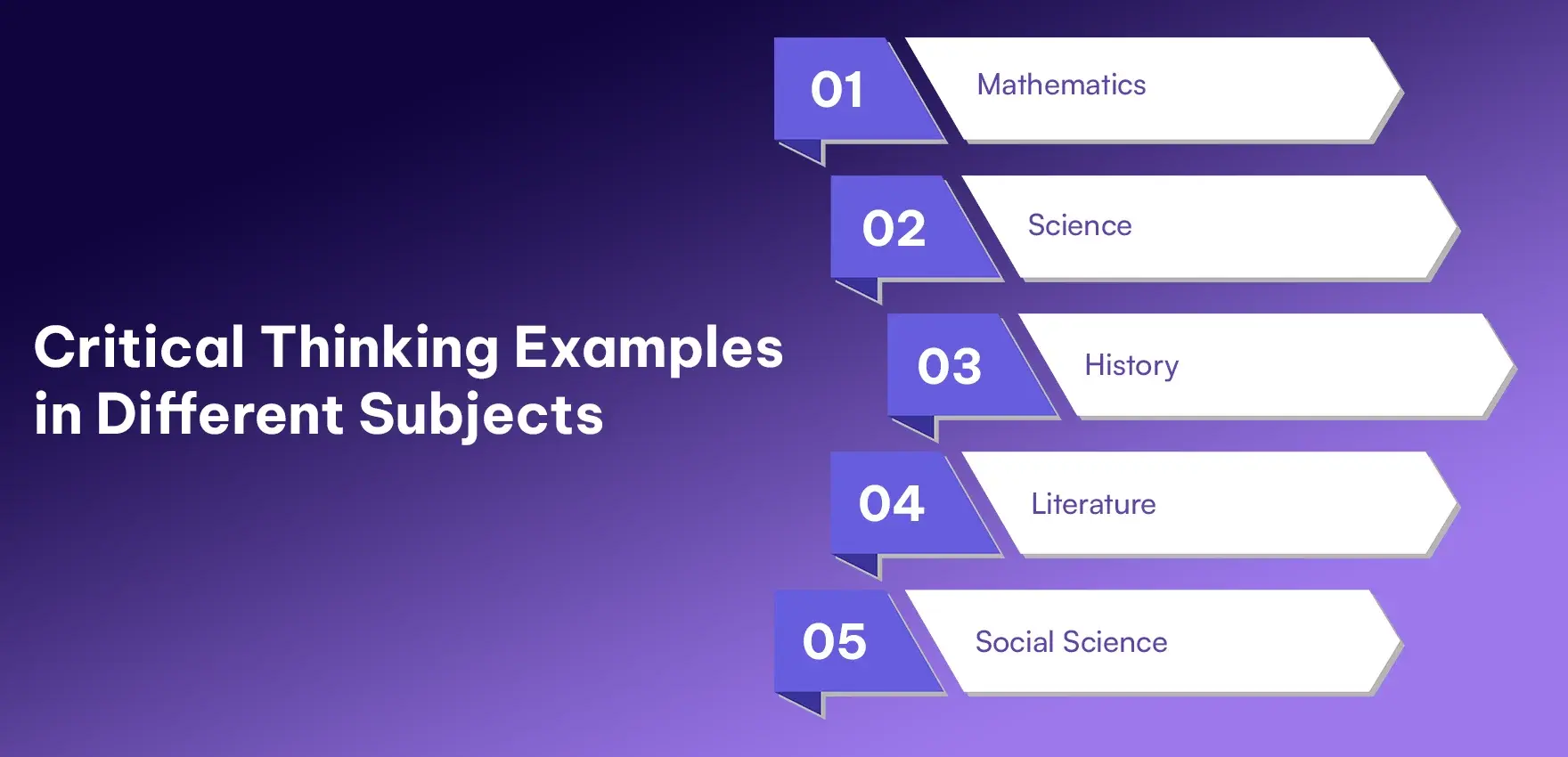
Mathematics By critical thinking, it can be said that students will develop the skills and techniques to break up complex problems logically and apply concepts to real life to help in making data-driven decisions.
Science This is the teaching for students about questioning theories, ways through which one analyzes the experimental results, and forming conclusions that are based on the evidence of the experimentation. This causes innovation and a better understanding of scientific principles.
History Critical evaluation of historical sources and events by students would show what they understand from the past regarding cause-and-effect relationships in the present. This gives them the capacity to make connections between past and present societal developments.
Literature With critical thinking, students learn how to read and interpret texts beyond the surface meaning. They engage in analysis of their character's motivations, themes, and symbolism towards deeper literary insights.
Social Science This helps students understand better the structures of society and the dynamics of cultures and humans into one environment. This creates a scenario where one can understand the issues affecting society and come up with sound solutions for them.
Why AssignmentGPT IO for A Better Education
AssignmentGPT IO is a new-generation platform for enhancing learning and developing critical thinking and problem-solving skills. Using AI-based solutions, students can develop their analytical skills, creativity, and understanding of a subject. It's a smart tool for enhancing education in order to prepare students for their academic careers.
Conclusion
Critical thinking is an important educational skill since students analyze information, solve problems, and, therefore, make informed decisions concerning those problems. By learning to think critically, students become prepared not just for the satisfaction of academic requirements but also for success in their future careers and for responsible citizenship. In addition to academics, critical thinking enhances the lifelong learning experiences of an individual while remaining adaptable to the changes of the world in encountering. AssignmentGPT IO is an AI-based innovation designed to enhance learning through alternatives that promote analytical thought, creativity, and problem-solving, making it a must-have solution for smarter and more effective education. The infusion of critical thinking into the education matrix grants students the independence to think and solve differently.
FAQs
1. What is critical thinking in education?
Critical thinking in education refers to the power to think logically and apply information, assess, and analyze it. It enables students to develop independent thought and problem-solving skills.
2. Why is critical thinking essential in learning?
It promotes deeper comprehension, enhances decision-making, and enables the application of knowledge in practical situations.
3. How does critical thinking help students?
It develops problem-solving abilities, enhances decision-making, stimulates creativity, and makes them well-informed individuals.
4. Can critical thinking be taught?
Yes, critical thinking can be taught by teachers to foster discussions, ask open-ended questions, and ask students to compare different options.
5. How can critical thinking contribute to the workplace?
It allows workers to dissect situations, improve decisions, innovate problem-solving, and communicate.
Latest Blog's
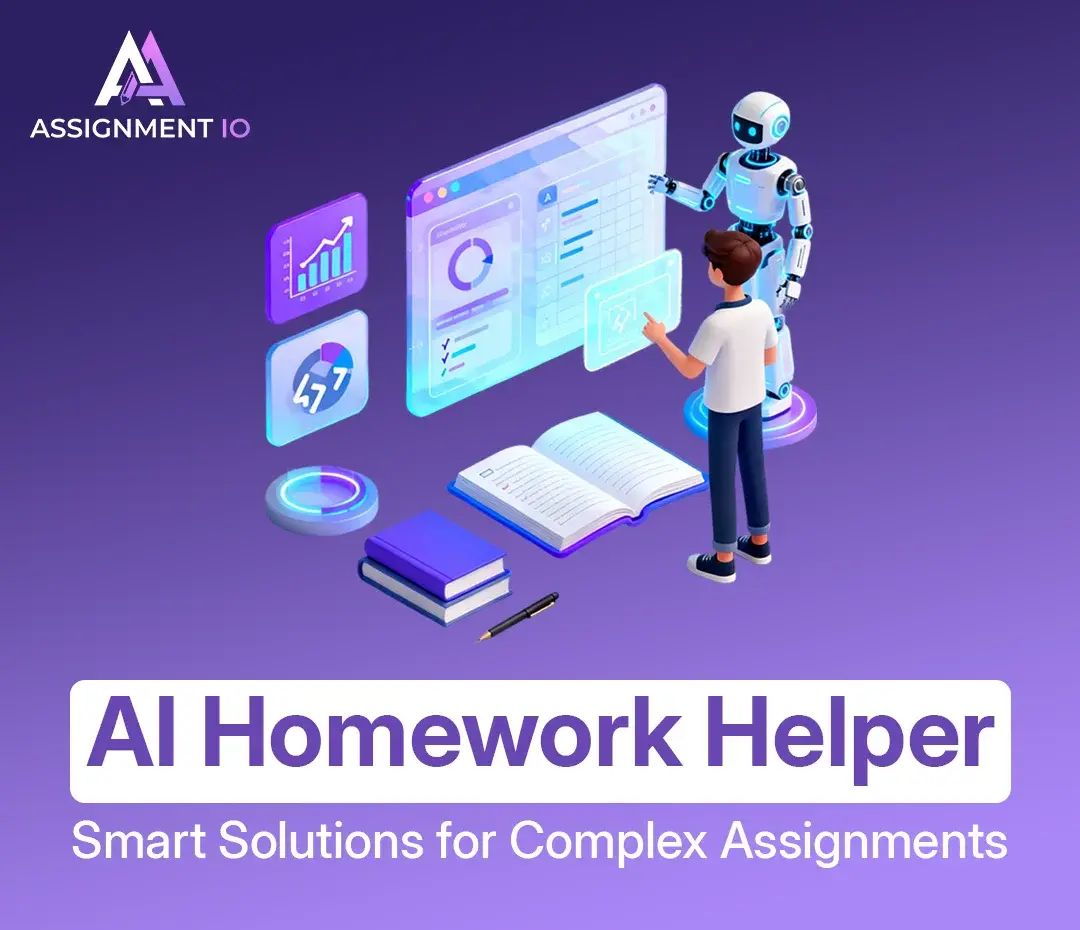
AI Homework Helpers offer fast solutions, personalized learning, and round-the-clock study support for students in every subject.

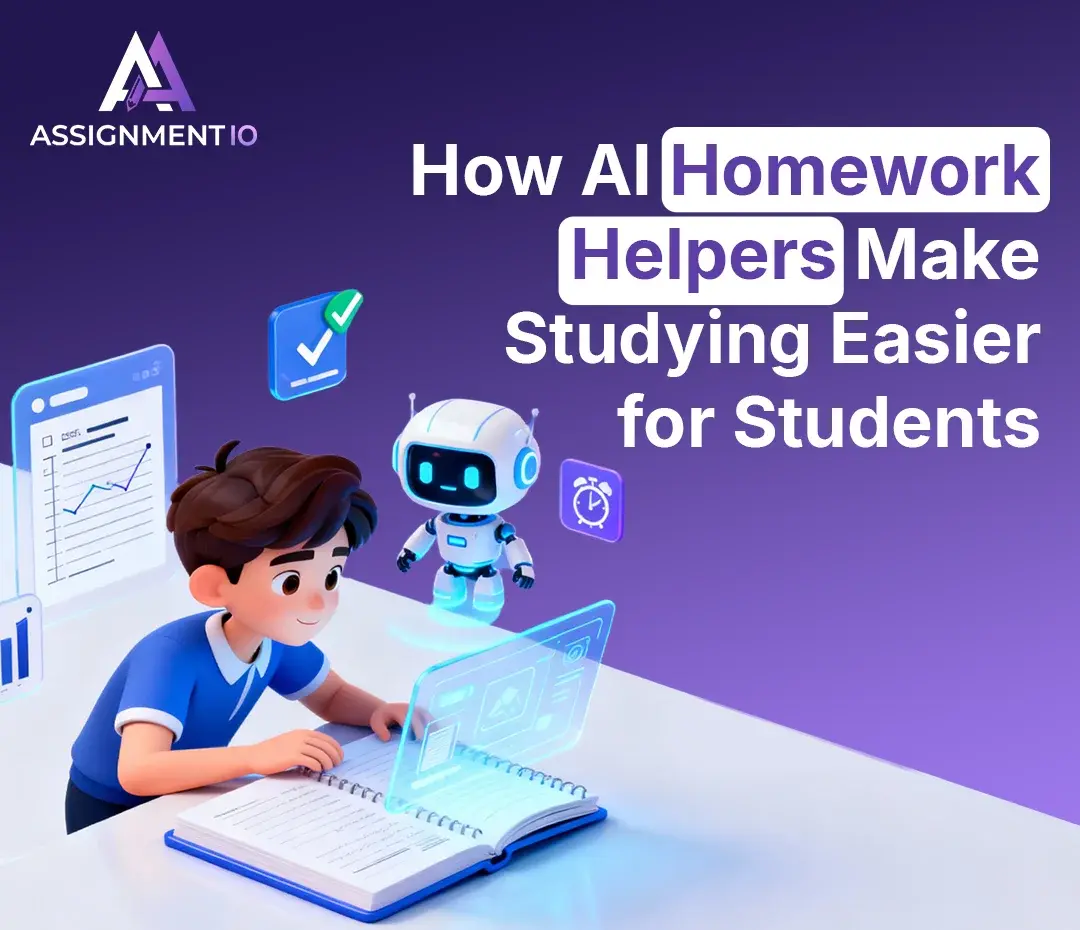
Master exams with superior scores and less study time. Step-by-step tips using ChatGPT, Khanmigo, and Quizlet.

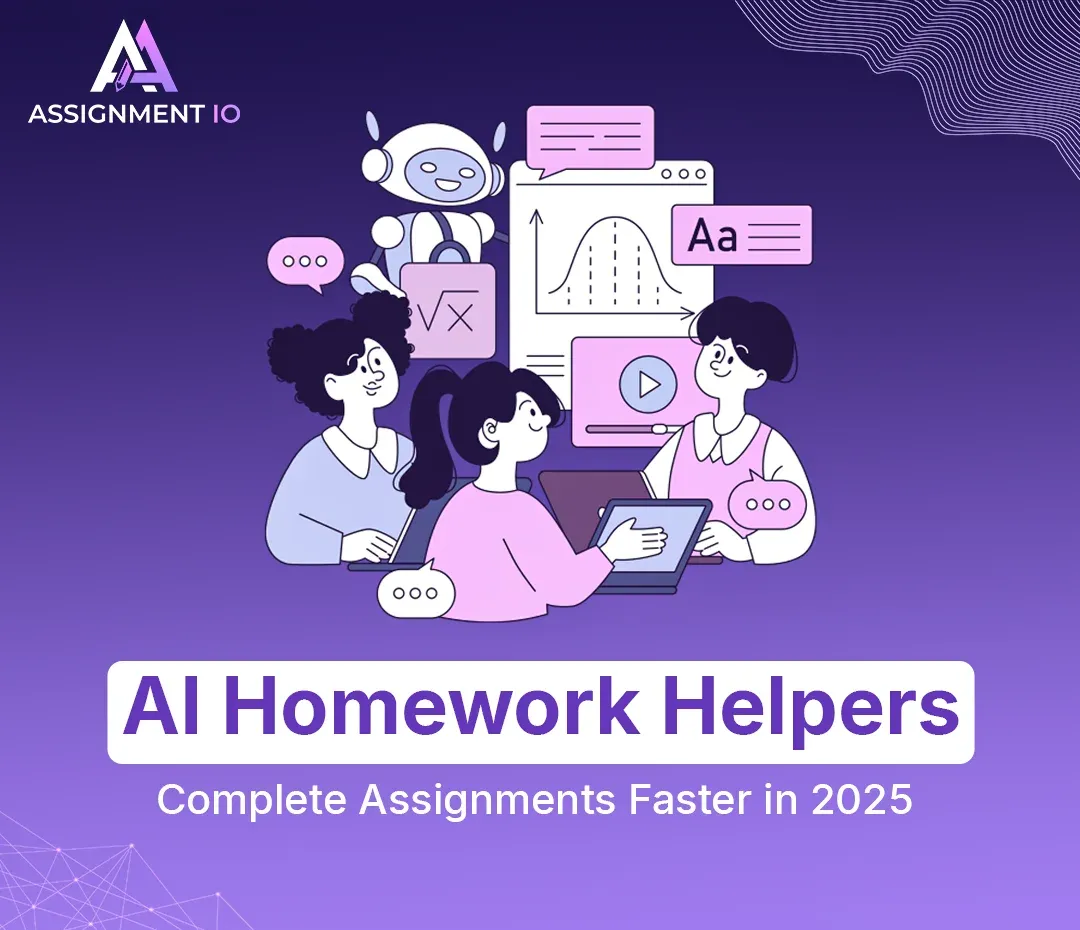
AI homework helpers streamline research, writing, and studying so students learn faster and complete assignments with less stress.

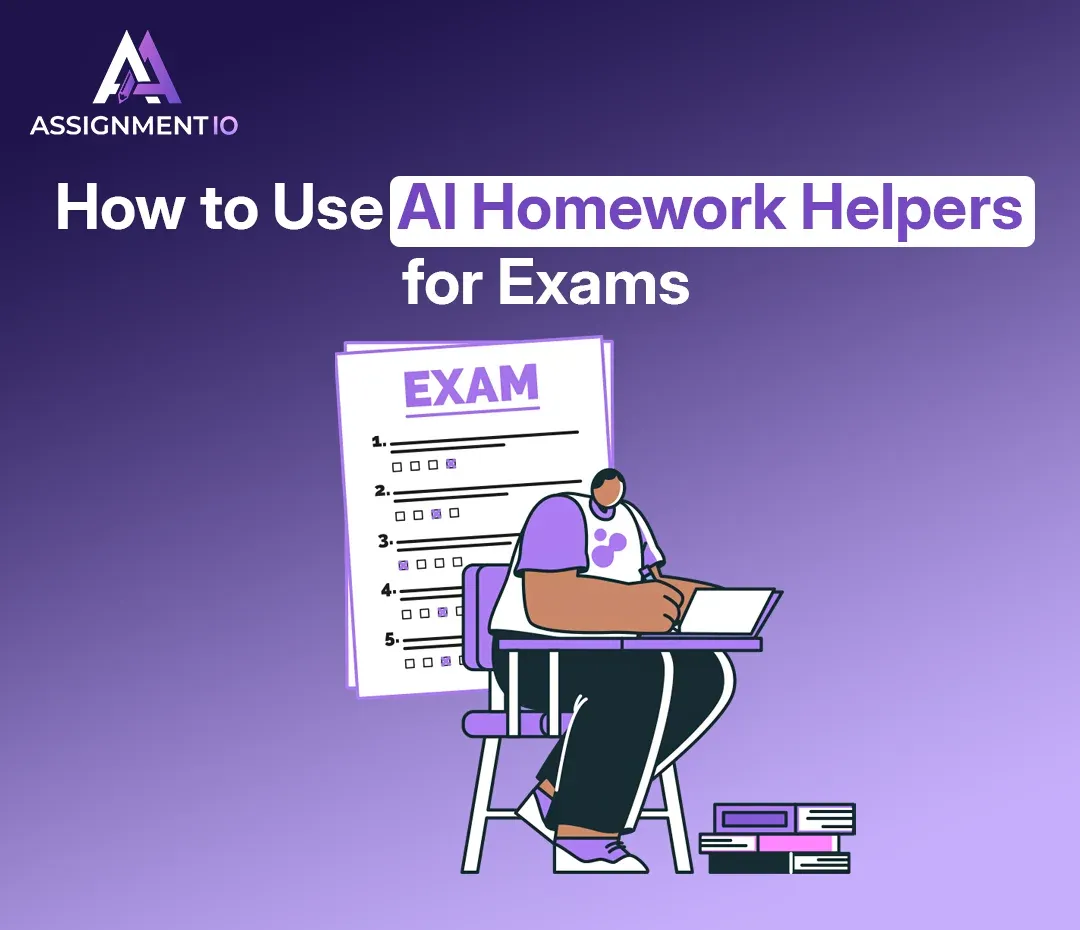
Master exams with superior scores and less study time. Step-by-step tips using ChatGPT, Khanmigo, Quizlet.

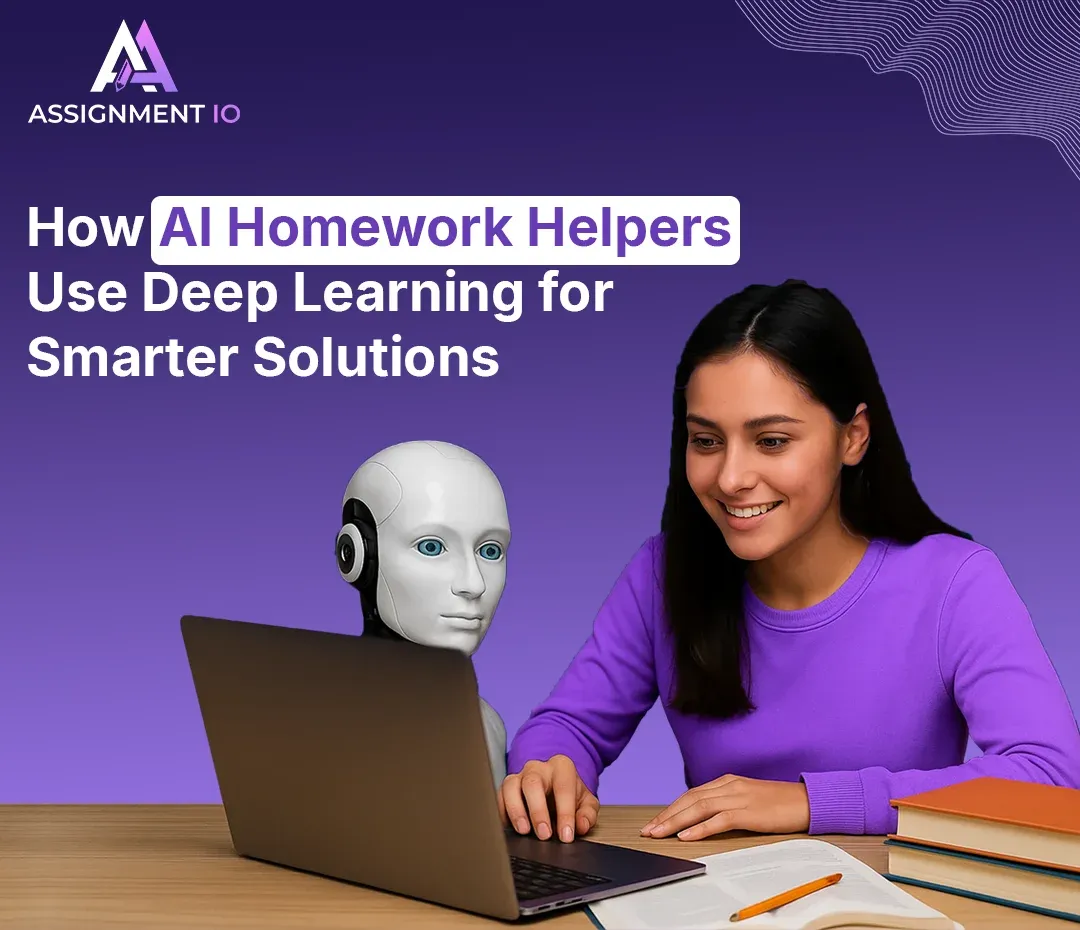
How deep learning makes AI homework helpers smarter, faster, and more personalized for students.

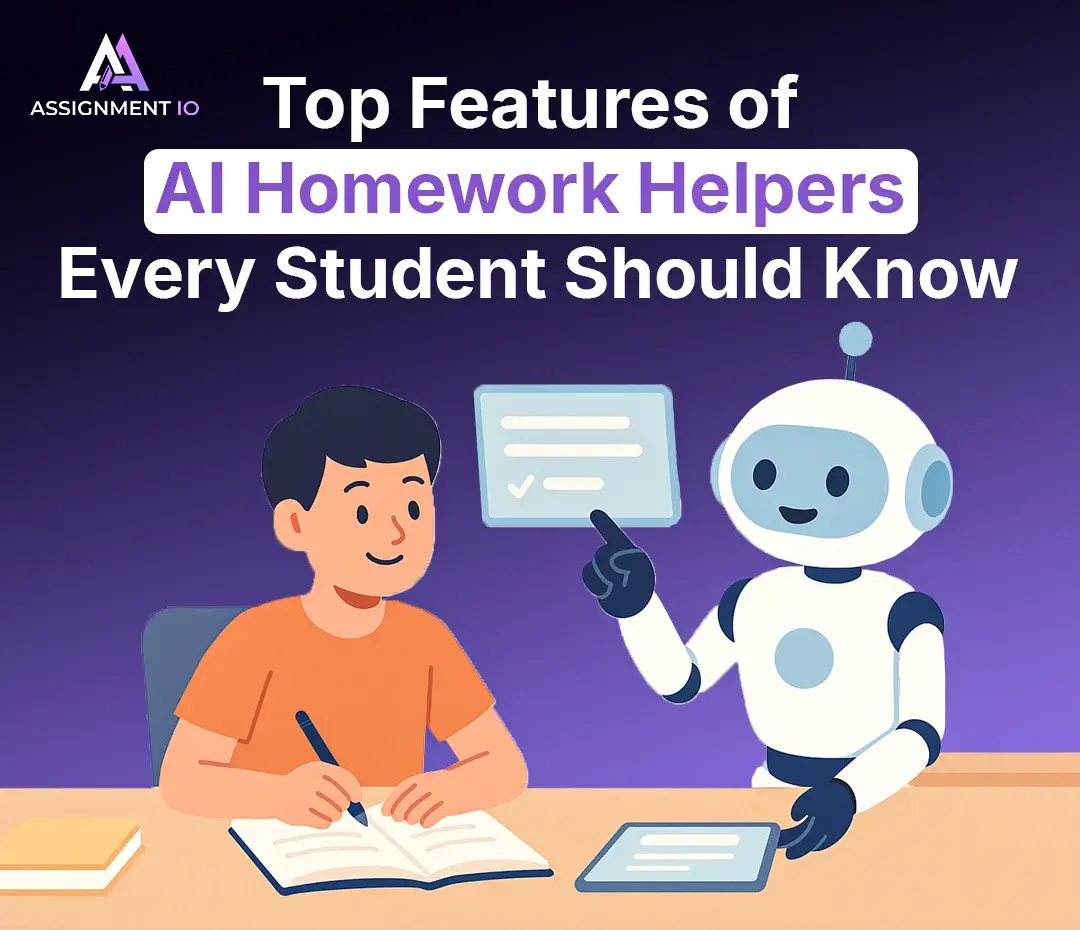
How AI homework helpers save time, boost learning, and provide personalized study support.

